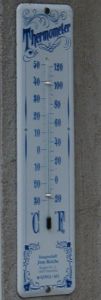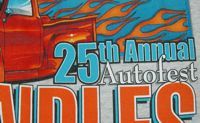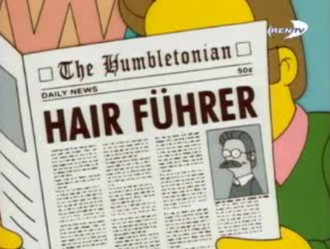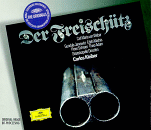
 Fahrenheit, F., Fah.,
Fahr. n.
Fahrenheit, F., Fah.,
Fahr. n.- a scale of temperature, named for Gabriel Daniel Fahrenheit
(1686-1736), the German physicist who devised it (in German-speaking
countries Celsius is now used exclusively).
- "Engine parts operated at a temperature of 2500 degrees
Fahrenheit, well above the melt temperature of most alloys, which
turned to soup at 2200 degrees." Michael Crichton, Airframe, 1996, p. 127.
- "A Fahrenheit's thermometer, in a mahogany case, and
with a barometer annexed, was hung against the wall, at some little
distance from the stove, which Benjamin consulted, every half-hour,
with prodigious veneration." James Fenimore Cooper, The Pioneers, p. 66.
- "This man bathed for the space of five minutes, and
without any injury to his sensibility or the surface of the skin, his
legs in oil, heated at 97° of Réaumur (250 degrees of
Fahrenheit) and with the same oil, at the same degree of heat, he
washed his face and superior extremities." Harry Houdini, Miracle Mongers and Their Methods: A
Complete Expose, 1920, p. 39.
- "On this very 2nd of October he had dismissed James
Forster, because that luckless youth had brought him shaving-water at
eighty-four degrees Fahrenheit instead of eighty-six; and he was
awaiting his successor, who was due at the house between eleven and
half-past." Jules Verne, Around the World in Eighty Days, 1873,
p. 5.
- "I'm burning through the sky, 200 degrees, that's why
they call me Mr. Fahrenheit." Queen, "Don't Stop Me
Now", Jazz, audio CD.
- "He recently lost fifty-two pounds by refusing to eat
anything that says 'nonfat' on it, and is working on his next film,
titled Fahrenheit 9/11." Michael Moore, Dude, Where's My Country?, 2003, p. 251.
- Fahrenheit 451, by Ray Bradbury.
- Fahrenheit 9/11, directed by Michael
Moore.
- More books and products related to Fahrenheit
- Fahrvergnügen,
Fahrvergnugen n.
- from Fahrvergnügen "driving pleasure":
used by Volkswagen in an advertising campaign in the US, no doubt in
order to emphasize European quality [< German fahren
"to drive" + Vergnügen "pleasure"].
This entry suggested by Bernhard
Heger. See also Vorsprung
durch Technik.
- "THE OTHER DAY, I LEARNED that
Fahrvergnügen—the clever-sounding German slogan that
Volkswagen has been using for years—is a real word, not just a
creation of the folks who brought us the New Beetle." Andrew
Gore, "Experience iBookgruven" Macworld, Jul. 2001.
- "The majority were attracted by a difficult-to-define
driveability—perhaps the quality that, back in the dark days, VW
sold as 'Fahrvergnugen.'", "Volkswagen Jetta: Close to
groovin'" AutoWeek, Jun. 28, 1999.
- "Already television viewers in the U.S. have seen signs
of a heightened linguistic confidence on the part of the Germans. One
example: a Volkswagen ad campaign that centers on the word
Fahrvergnugen, or joy in driving--however mispronounced it may be in
the commercials. Only a few years ago, the use of a German word in an
advertisement in English would have been avoided, if only because the
sound of German was associated with the bad guys in World War II
movies. Today Fahr--and other Vergnugen--may be here to stay."
Daniel Benjamin, "And Now for Sprachvergnugen" Time, Jan. 9, 1990, p. 79.
- faltboat n.
- from Faltboot "folding boat": a light,
collapsible boat made like a kayak, foldboat.
- feldspar, felspar n. feldspathic,
feldspathose, felspathic adj.
- from Feldspath, Feldspat "field spar": any
of several crystalline minerals made up mainly of aluminum silicates,
usually glassy and moderately hard, found in igneous rocks.
 "Its minerological constitution is not
simple; in some parts the rock is of a cherty, in others of a
felspathic nature, including thin veins of serpentine." Charles
Darwin, The Voyage of the Beagle, 1836.
"Its minerological constitution is not
simple; in some parts the rock is of a cherty, in others of a
felspathic nature, including thin veins of serpentine." Charles
Darwin, The Voyage of the Beagle, 1836.- Feldspar Diagenesis in Cambrian Clastic
Rocks of the Southern Ozark Mountains and Reelfoot Rift, Southeastern
Missouri and Northeastern Arkasas, by S.F. Diehl and Martin B.
Goldhaber, 1995.
- The 2000 World Forecasts of Quartz,
Mica, Felspar, Fluorspar, Cryolithe, and Chiolithe Export Supplies, by
Chiolithe Research Group, 2000.
- More books and products related to feldspar
- More books and products related to felspar
- Felsenmeer
n.
- "sea of rocks": chaotic, block-like assemblage of
fractured rocks or rock surfaces.
- "The result is mile upon mile of jagged, oddly angled
slabs of stone strewn about in wobbly piles known to science as Felsenmeer
(literally, 'sea of rocks')." Bill Bryson, A
Walk in the Woods, 1997.
- felspar n.
- See feldspar.
- -fest, fest
n.
- from Fest "festival celebration": festive
occasion, as in songfest; (slang) bout,
session as in gabfest; (slang) an
occasion with much, as in slugfest
[< Middle High German fest, vest < Latin festum
"festival", related to English feast and French fête].
This entry suggested by Alexandra
Schepelmann. See also festschrift.
 Annual
Autofest at Spindles
Auto Club
Annual
Autofest at Spindles
Auto Club- "The menopause one [documentary] was a lulu, a marathon
gripefest, an orgy of self-pity, women moaning
and grousing about their sad lives and the uncomprehending world
around them, and then some of those women showed up on the
mercury-poisoning one too—the symptoms of that
(forgetfulness, fatigue, depression, achiness) being symptoms of
menopause as well." p. 14, "They talked about what a shoozefest the conference was, compared to
other years, and my face burned." p. 122, "WSJO was in the
midst of a major screamfest, Wagner or the
Berlioz Requiem or something, Amazons with their heads thrown back and
their mouths open wide as grapefruit, their harpy hair stuck out,
their spears in hand." p. 125, "She went every morning to
her exercise group and enjoyed a long lunch and a bridge game and a
gabfest with her cronies and then a nap." p. 218, Garrison
Keillor, Wobegon Boy, 1997.
- "Far from the integrated love
fest of the 1960s, the Gombe chimpanzees were now more like the
Carrington family of television's Dynasty." Jonathan
Marks, What
It Means to Be 98% Chimpanzee, 2003, p. 164.
 "JAZZ
FEST", Poster in Lisa Simpson's room, "Summer of 4 Ft.
2" and several other episodes, The Simpsons, 1996.
"JAZZ
FEST", Poster in Lisa Simpson's room, "Summer of 4 Ft.
2" and several other episodes, The Simpsons, 1996.- "Time for some serious flamefesting!",
"eoff (end of flame fest :-)" Chris
DiBona et al., Open Sources: Voices from the Open
Source Revolution, 1999.
- "They even allowed BATF spokesperson David Troy get in
on the slugfest; Troy declared that Koresh was just a 'cheap thug who
interprets the Bible through the barrel of a gun.'" Carol Moore,
Davidian Massacre: Disturbing Questions
About Waco Which Must Be Answered, 1996.
- "'All's quiet along the Potomac. Those Beecher natives
are having some sort of a songfest, though.'" Victor Appleton, Tom Swift in the Land of Wonders, 1917.
- "Fiddle-Fest", composed by James E.
Clemens, 2003
- "Winterfest", composed by Stephen
Bulla, 2002
- festschrift, Festschrift n. [pl. Festschriften, festschrifts]
- from Festschrift "celebration writing":
commemorative volume, collection of writings usually by different
authors especially in honor of a scholar. See also fest.
- "I was in the Library today, looking through the files
of The Times Literary Supplement for something, when quite by
chance I turned up a long review of that Festschrift for Jackson
Milestone that I contributed to in '64, remember?" David Lodge, Changing Places, 1975, p. 126.
- "In a multiauthor book, such as a festschrift or the
proceedings of a symposium, it is often desirable to list the
contributors separately, with only the editor or editors appearing on
the title page (see 1.7)." The Chicago Manual of Style, 1993, p.
27.
- "This was a few days earlier, when I received a
Festschrift, a publication in which grateful pupils had commemorated
the jubilee of their teacher and laboratory director." Sigmund
Freud, The Interpretation of Dreams, 1911.
- "This book is presented as a sort of Festschrift
- a tribute to Cornell University as it enters the second
quarter-century of its existence, and probably my last tribute."
Andrew D. White, A History of the Warfare of Science With
Theology in Christendom, 1896.
- More books and products related to festschrift

- flak, flack
n.
- from Flak "antiaircraft gun": antiaircraft
gun; the shells fired from a flak bursting in air; criticism,
opposition [German Fliegerabwehrkanone, Flugabwehrkanone
< Flieger "flyer, airplane" or Flug
"flight" + Abwehr "defense" + Kanone
"canon, gun"]. This entry suggested by M. Larson. Thanks
also to Volker
Schindler.
- "'I hope you don't get too much flak when you change the
format,' I said. 'These classical music fans get pretty sour when you
take away their station.'" Garrison Keillor, Wobegon Boy, 1997, p. 278.
- "Many years ago, Police Explorers were shown a training
video called Flack Vest Testing by a Fool." Wendy
Northcutt, The
Darwin Awards, 2000, p. 180.
- "Real IRA threat forces RUC into flak
jackets" Henry McDonald, Observer, Oct. 22, 2000.
- Flak 88 - Elevation Zero: Actions of the
Flak Unit Kampfgruppe Döhler in Ground Combat in Upper Silesia,
Eastern Front, 1945, by Gerd Döhler, 2000.
- Radical Chic/Mau-Mauing the Flak
Catchers, by Tom Wolfe, 1992.
- More books and products related to flak
- flehmen, flehming n., to flehm,
to flehmen v.i.,
v.t.
- from flehmen "to flehm": a behavioral
response of many male mammals, for example deer, antelope and cats,
consisting of lip curling and head raising after sniffing a female's
urine, also called lip curl. This word is often capitalized, perhaps
due to a mistaken notion that it is named for someone [German flehmen
"to twist one's mouth"]. This entry suggested by Ekkehard Dengler.
- "The flehmen response and liquid-borne compounds
(non-volatile to low volatility) are generally assumed to be involved
in vomeronasal sensory perception (e.g., see Wysocki et al.
1980)." George Waring, Horse Behavior, 2002, p. 29.
- "Males that flehmen or flehm have a Jacobson's
organ." Raymond J. Corsini, The Dictionary of Psychology, 2002, p.
381.
- "The male smells and licks the female's vulva; then he
holds his head out and curls his lip up, in a behavior known as a
Flehmen response." Carol Ekarius, Small-Scale Livestock Farming: A
Grass-Based Approach for Health, Sustainability, and Profit, 1999, p.
52.
- "The smell they [the cats] tasted, flehming and
growling, was the stink of human death." Shirley Rousseau Murphy,
Cat in the Dark: A Joe Grey Mystery,
1999, p. 188.
- "Another characteristic expression [of the Feral Horse]
is the flehmen, in which the neck is extended and the upper lip
curled, exposing the teeth...." John O. Whitaker Jr., National Audubon Society Field Guide to
North American Mammals, 1996, p. 811.
- "When the [Jacobson's] organ is in use the cat will
appear to be grimacing with his mouth half open. This is called a flehmen
reaction (a German word with no English translation)." Pam
Johnson-Bennett, Twisted Whiskers: Solving Your Cat's
Behavior Problems, 1994, p. 9.
- "R. F. Ewer once had a tame male suricate (a small
burrowing animal native to Africa) who flehmed in response to sherry,
but the normal context is sexual." Muriel Beadle, The Cat: A Complete Authoritative
Compendium of Information About Domestic Cats, 1979, p. 60.
- flugelhorn, Flügelhorn, fluglephone,
flugel n.
- from Flügelhorn "wing horn": a
brass-wind instrument like the cornet in design but with a tone like
that of the French horn, sometimes considered to be a type of trumpet.
- "There's John McDoogal/Who plays on his flugel,/The
sweet sweet souinds of the blues." DJ Corchin, Band Nerds: Poetry from the 13th Chair
Trombone Player, 2006, p. 58.
- "In music, you have fluglephones (like Chuck Mangione),
and the normal trumpets like the ones used by Louis Armstrong, Maynard
Ferguson and Herb Alpert." Brad Bilsland, What It Means to Be in a Marching Band:
A Band Geek Perspective for the Musically Challenged, 2004, p. 12.
- "Concerto for Flugelhorn and Winds" Night, Again, composed by Daron Hagen,
1999.
 "CHUCK MANGIONE:
Flugelhorn, Electric Piano" from CD insert, Feels So Good, Chuck Mangione, 1977.
"CHUCK MANGIONE:
Flugelhorn, Electric Piano" from CD insert, Feels So Good, Chuck Mangione, 1977.- flugelhorn lexicon entry at SheetMusicDB.net
- Sheet music and scores for flugelhorn
- More CDs and products related to flugelhorn
- foehn, föhn n.
- from Föhn: a warm, dry wind blowing down the
side of a mountain, especially in the Alps [Middle High German phönne;
Old High German fonno; Late Latin faunjo < Latin Favonius,
"west wind"]. In German Föhn, Fön also
means a hot-air dryer (for hair).
- "Then why not turn your back to the Foehn and go to
Lucerene or-- ?" Elizabeth Robins, The Mills of the Gods, 1898.
- "It seems to us that at certain times the easterly winds
in Greenland show a similar character to the 'Foehn' in Switzerland;
and since the second German Polar Expedition discovered very high
mountain-ranges in the eastern part of this arctic continent, we do
not hesitate to pronounce such winds as described hereafter to be true
Foehns." United States Navy Department, Scientific results of the U.S. Arctic
expedition..., 1876, p. 55.
- "Ashbery has explicitly addressed closure as a site of
authorial strategy in an interview when he was asked whether he ever
played a joke on his readers. Ashbery replied:
A gag that has probably gone unnoticed turns up in the last sentence
of the novel I wrote with James Schuyler [A Nest of Ninnies].
Actually, it's my sentence. It reads: 'So it was that the cliff
dwellers, after bidding their cousins good night, moved off towards
the parking area, while the latter bent their steps toward the
partially rebuilt shopping plaza in the teeth of the freshening
foehn.' Foehn is a kind of warm wind that blows in Bavaria that
produces a fog. I would doubt that many people know that. I liked the
idea that people, if they bothered to, would have to open up the
dictionary to find out what the last word in the novel meant."
John Vincent, "Reports of looting and insane buggery
behind altars: John Ashbery's queer politics", Twentieth
Century Literature, Summer 1998.
- "If on a certain day you find that many people scowl at
you and are unusually edgy, the phenomenon would probably be better
explained in meteorological rather than in psychological terms. It is
Föhnwetter, caused by the warm southern wind, föhn (a term
used in German and French-speaking Switzerland; 'foehn' in
English)." Marcel Bucher, "Headache Wind", Swiss
News, Jan. 2, 2001.
- CDs and products related to foehn
 foosball n.
foosball n.- probably from (Tisch-) Fußball "(table)
football": a table soccer game in which the ball is moved by
manipulating small figures attached to rods, also called table soccer,
table football, babyfoot (the French term), and gettone. This word is
often capitalized, perhaps due to a mistaken notion that it is a
trademark [German Fußball (transliterated Fussball)
"football, soccer" < Fuß "foot" +
Ball "ball"]. This entry suggested by Christian Heldt.
- "Sometimes Demo Karafilis took us downstairs to play
Foosball, and, moving among the heating ducts, spare cots, battered
luggage, we would tunnel through to the small room Old Mrs. Karafilis
had decorated to resemble Asia Minor." Jeffrey Eugenides, The Virgin Suicides, 1994, p. 171.
- "Apart from the restaurant, which has decent food
(though the pizza is a cheesy bomb), it has a bar with a pool table,
darts and foosball." Carolina Miranda & Paige
Penland, Lonely Planet Costa Rica, 2004, p. 365.
- "She'd use the same self-discipline she used for
studying in college, marching off to the library while the rest of us
procrastinated over foosball and beer." Lolly Winston, Good Grief, 2004, p. 150.
- "'You want to come back to the house for a game of
foosball?' Foosball, for those of you who lack a basic education, is
that tabletop bar game with the soccer-type men skewered on
sticks." Harlan Coben, No Second Chance, 2004, p. 89.
- "The judge was in his customary booth near the Foosball
machines." Carl Hiaasen, Strip Tease, 2004, p. 66.
- "Have your BOSS run tournaments out of your day room
(pool, foosball, ping-pong, darts, etc)." Nate Allen & Tony
Burgess, Taking the Guidon: Exceptional
Leadership at the Company Level, 2001, p. 152.
- "On dates, I'd feigned interest in all sorts of
nonsense—trout fishing, Civil War reenactments, foosball."
Susan Jane Gilman, Hypocrite in a Pouffy White Dress, 2005,
p. 239.
- More books and products related to foosball
- to fotz around v.i.
- probably from Fotz, Fotze "(vulgar)
vagina": to mess around, fool around, (vulgar) fart around. Due to
this last meaning and the similar spelling some think to fotz
means "to fart". [< Middle High German vut
"vagina". (In Austria and Bavaria Fotze, Fotzen is
dialectal slang for "mouth, face" and by extension "a
slap in the face, box on the ear". Fotzhobel is a
humorous term for "mouth organ", literally "a
carpenter's plane for the mouth". In Austria Fotze does
not have the vulgar meaning it does in Germany)]. This entry suggested
by Volker Knopp.
- "I don't want to have to fotz around with all this
nonsense and still not end up with real system synergy." Chip
Stern, Equipment Report, Stereophile, Jan. 2001, p. 108.
- frank n.
- See frankfurter.
-
Frankenstein, Frankenstein's monster, Dr. Frankenstein, Franken-
n.
- from Frankenstein "stone of the Franks":
pertaining to the monster in the 1818 novel Frankenstein by
Mary Wollstonecraft Shelley or to the doctor who created it;
figuratively, any horrific creation that gets out of control and
becomes evil and/or destroys its creator. Frankenstein was inspired by
a dream Shelley had while visiting the poet Lord Byron's villa in
Switzerland on a dark and stormy night where ghost stories were read.
She may have gotten the name itself from Frankenstein Castle in Germany [Frankenstein
< German Franken "the Germanic tribe of the
Franks" + Stein "stone, mountain"].
- "I'll admit that this Frankenstein Complex you're
exhibiting has a certain justification—hence the First Law [of
Robotics] in the first place." Isaac Asimov, I, Robot, 1950, p. 145.
- "Then there is the Frankenstein of [trom-] bones, the
double-bass bone." Brad Bilsland, What It Means to Be in a Marching Band:
A Band Geek Perspective for the Musically Challenged, 2004, p. 18.
- "Apparently he was to be the recipient of one of her
laboratory failures, in the way of Dr Frankenstein bestowing upon him
a poorly functioning hand." Martha Grimes, The Stargazey: A Richard Jury Mystery,
1998, p. 75.
- "He had also a superabundance of the discordant,
ear-splitting, metallic laugh common to his breed -- a machine-made
laugh, a Frankenstein laugh, with the soul left out of it." Mark
Twain, Life on the Mississippi, 1906.
- "When it was my turn to watch over Billy or to comfort
him at night I would think – I am some Frankenstein's monster
with a defective brain which sometimes wants to cast what it might
love into a river like the petals of a flower: but since I know this,
then might not this be some new growth in a not totally defective
brain – do you hear me, Billy!" Nicholas Mosley, Children of Darkness and Light, 1997.
- "In 1998, incensed by regulatory failures that allowed
mad cow disease to become a multibillion-dollar
catastrophe, Europeans protested the 'Frankenfoods' entering their
markets." Jennifer Ackerman, "Food: How Altered?", National Geographic, May 2002, p.49.
- Frankenstein or the Modern Prometheus,
by Mary Shelley, 1818.
- More books and products related to Frankenstein

- frankfurter, frank, frankfurt, frankforter, frankfort
n.
- from Frankfurter (Wurst) "Frankfurt
(sausage)": a kind of sausage used in hotdogs, wiener. Residents of the German city of
Frankfurt call them Wiener, while residents of the Austrian
city of Vienna (Wien) call them Frankfurter.
- Frau, frau,
Fr. n. [pl. Frauen, Fraus]
- from Frau "woman, wife, Mrs.": a married
(German or German-speaking) woman, Mrs., Ms., Madam, a wife [<
Middle High German vrowe < Old High German frouwa
"mistress, lady"]. See also Fräulein,
hausfrau, Liebfraumilch.
- "Then--comes it visiting hour--enter his frau,
Annoya--and--exit his humor--Listen to our hero--" Al Scaduto, They'll Do It Every Time, comic strip,
Jun. 26, 2004.
- "There was a moment of breathless staring on the part of
the respectable middle-class Frauen at the other tables." Edna
Ferber, Dawn O'Hara, the Girl who Laughed, p.
129.
- Dr. Frau: A Woman Doctor Among the Amish,
Grace H. Kaiser, 1986.
- Visions of the 'Neue Frau': Women and
the Visual Arts in Weimar Germany, Marsha Meskimmon & Shearer
West, 1995.
- More books and products related to Frau
-
Fräulein, fräulein, Fraulein,
fraulein, Frl. n.
[pl. Fräulein, Fräuleins]
- from Fräulein "young or unmarried woman,
miss, Miss, waitress": an unmarried or young German (-speaking)
woman, Miss, [chiefly Br.] a German governess [< German Frau + -lein diminutive form]. See
also Frau. This entry suggested by Hans-Michael Stahl and Bastian Sick.
- "She is not my maid. She is Fraulein Arpent."
Rebecca Harding Davis, Frances Waldeaux, 1897, p. 21.
- "Shortly after, with a good deal of rustling and
bustling Fräulein Rottenmeier appeared, who again seemed very
much put out and called to Heidi, 'What is the matter with you,
Adelheid? Don't you understand what breakfast is? Come along at
once!'" Johanna Spyri, Heidi, before 1891, p. 105.
- "Toward the end of last year, I spent a few months in
Munich, Bavaria. In November I was living in Fraulein Dahlweiner's
PENSION, 1a, Karlstrasse; but my working quarters were a mile from
there, in the house of a widow who supported herself by taking
lodgers." Mark Twain, Life on the Mississippi, 1870.
- "No wonder, then, that the good Frau
Professorin gathered her Fraulein under her wing, and resented the
attentions of such a mauvais sujet." Arthur Conan Doyle, The Captain of the Polestar and other
Tales, 1894, p. 86.
- "Me, I could never have warred with that Fraulein who
served us -- so haughty she was, nicht?"
Edna Ferber, Dawn O'Hara, the Girl who Laughed, p.
144.
- "After having been engaged to an American actor, a Welsh
socialist agitator, and a German army officer, Fraulein Furst at last
placed herself and her great brewery interests into the trustworthy
hands of Otto Ottenburg, who had been her suitor ever since he was a
clerk, learning his business in her father's office." Willa
Sibert Cather, The Song of the Lark, 1915, p. 144.
- "She had not believed in Him at the time, but because
she was frightened after she had stuck the scissors into Fraulein she
had tried the appeal as an experiment." Frances Hodgson Burnett,
T. Tembarom, 1913, p. 274.
- More books and products related to Fräulein
- Frauleinwunder n.
- from Fräuleinwunder "young woman
wonder": a spectacular young German woman [< German Fräulein + Wunder
"wonder, miracle"]. See also Fräulein,
Wirtschaftswunder and wunderkind. This entry suggested by Hans-Michael Stahl.
- Der
Freischütz, Der Freischutz n.
- from Der Freischütz "The Free
Shooter": a German romantic opera written by Carl Maria von Weber
in 1821.
 to fress v.i., v.t.
to fress v.i., v.t.- from fressen "(slang) eat without
restraint": to eat or snack especially often or in large
quantities, gluttonize, eat like a pig [< German fressen
"(of animals) to eat" perhaps via Yiddish fres,
fresn]. This entry suggested by Jan Neidhardt.
- "New York has just a fraction of the number of kosher delis it did thirty years ago, so come, fress,
and enjoy Essex on Coney." Ellen Freudenheim, Brooklyn!: The Ultimate Guide to New
York's Most Happening Borough, 2004, p. 281.
- "We didn't expect to shoot a wild turkey, just to fress
on this as a snack or as a complement to a grilled trout." Rick
Greenspan & Hal Kahn, The Leave-No-Crumbs Camping Cookbook:
150 Delightful, Delicious, and Darn-Near Foolproof Recipes from Two
Top Wilderness Chefs, 2004, p. 90.
- "I described for him the period of my life when I first
began to break the laws of kashrut, the weeks of frenzied
fressing in which I tried to experience all the sapid sensations of
which I had been deprived in my previous seventeen years."
Rebecca Goldstein, The Mind-Body Problem, 1993, p. 262.
- "Guy! Guy! You're fressing like a swine! You're gobbling
goo like a demented animal!" Norman Spinrad, Child of Fortune, 2002, p. 291.
- "There, young orthos dated discreetly while the numerous
children of large observant families scampered and fressed
and a bearded, skullcapped mashgiach gloomily patrolled the
premises, ensuring that everything was in accordance with Jewish
law." Jonathan Rosen, Joy Comes in the Morning, 2005, p. 256.
- "When we come back to our homes and routines, we should
be feeling well-refreshed, not well-fressed." Chava Goldman, How to Succeed on Any Diet: A Jewish and
Friendly Guide to Dieting & Exercise, 2005, p. 236.
- "By the way, I just fressed your old man." V. E.
Rosswell, Into the Deep, 1998, p. 182.
- Freudian adj.,
n., Freudianism n.
- from Freudsche, freudsche, Freud'sche, Freudianer
"Freudian": of or according to Freud or his theories and
practice; a person who believes in Freud's theories or uses his methods
in psychoanalysis; after Sigmund Freud, 1856-1939, Austrian physician
and psychiatrist [< German Freude "joy,
happiness" < Middle High German vröude < Old
High German frewida, frouwida]. This entry suggested by Wilton Woods.
-
"It's just a fantasy, and it fits you like a Freudian
glove." Michael Crichton, Travels, 1988, p. 337.
- "But their work was largely forgotten when the early
mutations-are-everything geneticists turned their backs on Darwin and
the psychologists became so enamored of the behaviorist and Freudian
extremes that they could tolerate no other way of looking at
things." William H. Calvin, The Ascent of Mind: Ice Age Climates and
the Evolution of Intelligence, 1990.
- "EXCITATION AND INHIBITION have a range of connotations,
even Freudian ones, but to neurophysiologists they mean something
close to addition and subtraction, or deposits and withdrawals."
William H. Calvin & George A. Ojemann, Conversations With Neil's Brain: The
Neural Nature of Thought and Language, 1994.
- "And so they wind up with separate departments of
thinking, feeling, and willing (translated into Freudian terminology:
ego, id, and superego)." William H. Calvin, The Cerebral Symphony: Seashore
Reflections on the Structure of Consciousness, 1989.
- "In the language of medical psychology, to suggest to
the President that the treaty was an abandonment of his professions
was to touch on the raw a Freudian complex." John Maynard Keynes,
The Economic Consequences of the Peace,
1919.
- "Such imagery is very bold – what the Freudians
could make of it!" Dorothy Day, On Pilgrimage, 1999.
- "And we know from the Freudian teachings what
suppressions in the root-instincts necessarily mean." Edward
Carpenter, Pagan and Christian Creeds: Their Origin
and Meaning, 1920, p.189.
- More books and products related to Freudian
- fritz, fritz out, be on
the fritz, go on the fritz v.i.
- perhaps from Fritz, diminutive of Friedrich
"Frederick": to be or become broken or inoperable
- "The captain's pocket watch was on the fritz, and John
said, 'I can fix watches,' so he went to work on it." Garrison
Keillor, Wobegon Boy, 1997, p. 96.
- "Simply put, this is the theory that sooner or later all
our entertainment and communication appliances (computer, TV, radio,
home stereo, VCR, telephone, answering machine, toaster, etc.) will
slowly coalesce into one big digital doohickey, a stunning
technological advance which will present consumers with the
unprecedented opportunity to have absolutely every gadget we own go on
the fritz simultaneously." Evan Morris, The Book Lover's Guide to the Internet, 1998, p.
31.
- Fritz n.
- from Fritz "Fred", diminutive of Friedrich
"Frederick": [Slang] a German (soldier): sometimes offensive
[< German Friedrich "peaceful ruler" < German
Friede "peace" < Middle High German vride
< Old High German fridu + Middle High German rich,
riche < Old High German rihhi "ruler"]. See also
Heinie.
 "A
French Gun Much Respected by Fritz" caption of a picture of a
cannon in Edward R. Coyle, Ambulancing on the French Front, 1918.
"A
French Gun Much Respected by Fritz" caption of a picture of a
cannon in Edward R. Coyle, Ambulancing on the French Front, 1918.- "In other places a large party would be seated on the
ground-I do not say because they could not get up, though one of the
Fritzes slyly insinuated something of the kind, but because they could
not get a big barrel around which they were seated up with them; they
therefore preferred to be near the faucet; and it made one thirsty on
that warm day to see how eagerly they held the long glasses under the
steady flow of the golden-colored liquid, and how, with sparkling
eyes, they put it to their lips, as if Paradise lay in the bottom of
the mug." W.W. Wright, Doré. By a stroller in Europe,
1857, p. 248.
- Führer, Führer,
Fuehrer, der Führer, führer,
fuehrer n.
- from (der) Führer "(the) leader,
guide": (the) leader, applied to Adolf Hitler [< Middle High
German vüerer < vüeren "to lead,
bear" < Old High German fuoren "to lead";
related to Old English faran "to go"]. Since der
Führer is often connected with Hitler in German too, one sometimes
uses Leiter to mean "leader" instead. See further
examples under Reich and Schutzstaffel.
 "HAIR FÜHRER", Newspaper
headline, "Home Away from Homer", season 16, episode 20, The Simpsons, May 15, 2005.
"HAIR FÜHRER", Newspaper
headline, "Home Away from Homer", season 16, episode 20, The Simpsons, May 15, 2005.- "Herr Gröpenfuhrer! Herr Gröpenfuhrer!"
reporters clamoring for Arnold Schwarzenegger's attention, alluding to
his alleged groping and Hitler statements, Garry Trudeau, Doonesbury, Oct. 22, 2003.
- "While the formal charge against Wasner was 'maliciously
slandering the Führer,' the actual crime for which he faced
beheading was his embarrassing explanation of Hitler." Ron
Rosenbaum, "Explaining Hitler", The New Yorker, May 1995.
- "'I'm not opposed to the fact that he [John William
King] killed a black guy,' says Davis Wolfgang Hawke, a college
student who says his ambition is to be the first führer of the
United States.", "At school he's [Davis Wolfgang Hawke] a
pariah, but on the Web he's the führer reincarnate.", Matt
Bai & Vern E. Smith, "Evil to the End", Newsweek, Mar. 8, 1999.
- American Fuehrer: George Lincoln
Rockwell and the American Nazi Party, by Frederick James Simonelli,
1999.
 "Indeed, the despotic
Führer, who prohibited any kind of satirically disrespectful
treatment of himself and his policies, would be extremely annoyed if
he read the contentious comic book, Adolf, the Nazi Pig, which is currently raising
laughter, eyebrows and hackles in Germany." Ursula Sautter,
"Can Der Führer Be Funny?", Time, Aug. 17, 1998.
"Indeed, the despotic
Führer, who prohibited any kind of satirically disrespectful
treatment of himself and his policies, would be extremely annoyed if
he read the contentious comic book, Adolf, the Nazi Pig, which is currently raising
laughter, eyebrows and hackles in Germany." Ursula Sautter,
"Can Der Führer Be Funny?", Time, Aug. 17, 1998.- More books and products related to fuehrer
Please do not plagiarize. If you would
like to use this information in a print or electronic publication,
please ask me for
permission first and cite this page as:
Knapp, Robbin D. 2009.
"GermanEnglishWords.com:
F". In Robb:
GermanEnglishWords.com. Jan. 4, 2009.
You can order most of the cited books and other media through Amazon simply by clicking on the titles.

 Fahrenheit, F., Fah.,
Fahr. n.
Fahrenheit, F., Fah.,
Fahr. n. "Its minerological constitution is not
simple; in some parts the rock is of a cherty, in others of a
felspathic nature, including thin veins of serpentine." Charles
Darwin, The Voyage of the Beagle, 1836.
"Its minerological constitution is not
simple; in some parts the rock is of a cherty, in others of a
felspathic nature, including thin veins of serpentine." Charles
Darwin, The Voyage of the Beagle, 1836. Annual
Autofest at Spindles
Auto Club
Annual
Autofest at Spindles
Auto Club "JAZZ
FEST", Poster in Lisa Simpson's room, "Summer of 4 Ft.
2" and several other episodes, The Simpsons, 1996.
"JAZZ
FEST", Poster in Lisa Simpson's room, "Summer of 4 Ft.
2" and several other episodes, The Simpsons, 1996.
 "CHUCK MANGIONE:
Flugelhorn, Electric Piano" from CD insert, Feels So Good, Chuck Mangione, 1977.
"CHUCK MANGIONE:
Flugelhorn, Electric Piano" from CD insert, Feels So Good, Chuck Mangione, 1977. foosball n.
foosball n.
 Der Freischütz, composed by Carl
Maria von Weber, 1998.
Der Freischütz, composed by Carl
Maria von Weber, 1998. "A
French Gun Much Respected by Fritz" caption of a picture of a
cannon in Edward R. Coyle, Ambulancing on the French Front, 1918.
"A
French Gun Much Respected by Fritz" caption of a picture of a
cannon in Edward R. Coyle, Ambulancing on the French Front, 1918. "HAIR FÜHRER", Newspaper
headline, "Home Away from Homer", season 16, episode 20, The Simpsons, May 15, 2005.
"HAIR FÜHRER", Newspaper
headline, "Home Away from Homer", season 16, episode 20, The Simpsons, May 15, 2005. "Indeed, the despotic
Führer, who prohibited any kind of satirically disrespectful
treatment of himself and his policies, would be extremely annoyed if
he read the contentious comic book, Adolf, the Nazi Pig, which is currently raising
laughter, eyebrows and hackles in Germany." Ursula Sautter,
"Can Der Führer Be Funny?", Time, Aug. 17, 1998.
"Indeed, the despotic
Führer, who prohibited any kind of satirically disrespectful
treatment of himself and his policies, would be extremely annoyed if
he read the contentious comic book, Adolf, the Nazi Pig, which is currently raising
laughter, eyebrows and hackles in Germany." Ursula Sautter,
"Can Der Führer Be Funny?", Time, Aug. 17, 1998.


![]()